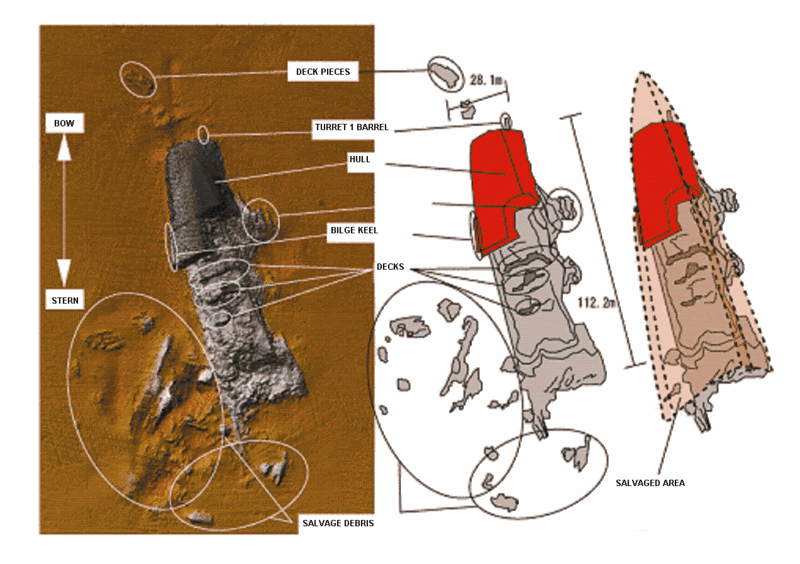IwakuniDiver
Contributor
I know that there are few wreck divers that think it's perfectly acceptable to pillage any wreck they come across. Especially when that wreck is a war grave.
My question pertains to Mutsu specifically but could be expanded to include a few other sites as well I suppose. I have always had a strict policy for everyone that I take down on Mutsu with me of "look but don't touch" for the simple reason that it's a site where over 1000 Japanese sailors lost their lives. But an interesting point was brought up to me recently.
The Japanese government turned over salvage rights to Mutsu to the Fukeda Salvage Company in 1970 and they promptly began an 8 year salvage operation that brought up nearly 75% of the wreck's bulk. This included the bow, forward of turret 1, and nearly everything aft of the bridge. Here's a pic of what is left as of last year courtesy of LM Marine.

So my question is this. At this point what are your feelings on taking small, non-personal, artifacts from a wreck, such as gas masks or such after a wreck has been salvaged then abandoned? There are hundreds of such wrecks in the Japanese Coastal waters, both civilian and military, especially near Kure, in this particular state.
Not that I'm planning on altering my "don't touch" policy, I just wanted to gauge some opinions.
Scott
My question pertains to Mutsu specifically but could be expanded to include a few other sites as well I suppose. I have always had a strict policy for everyone that I take down on Mutsu with me of "look but don't touch" for the simple reason that it's a site where over 1000 Japanese sailors lost their lives. But an interesting point was brought up to me recently.
The Japanese government turned over salvage rights to Mutsu to the Fukeda Salvage Company in 1970 and they promptly began an 8 year salvage operation that brought up nearly 75% of the wreck's bulk. This included the bow, forward of turret 1, and nearly everything aft of the bridge. Here's a pic of what is left as of last year courtesy of LM Marine.

So my question is this. At this point what are your feelings on taking small, non-personal, artifacts from a wreck, such as gas masks or such after a wreck has been salvaged then abandoned? There are hundreds of such wrecks in the Japanese Coastal waters, both civilian and military, especially near Kure, in this particular state.
Not that I'm planning on altering my "don't touch" policy, I just wanted to gauge some opinions.
Scott




